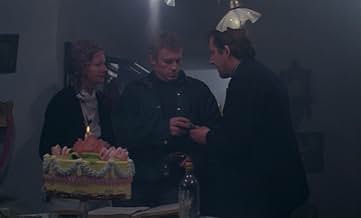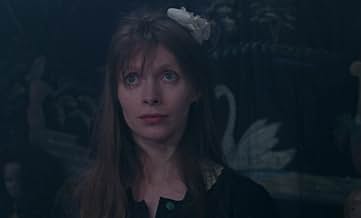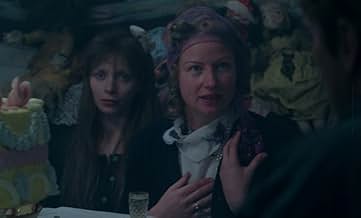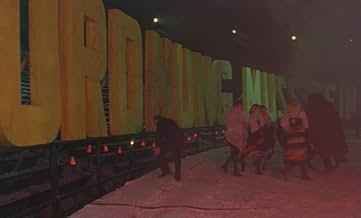IMDb RATING
7.0/10
1K
YOUR RATING
In the 21st century, prisoners aboard penitentiary space ships explore unknown worlds.In the 21st century, prisoners aboard penitentiary space ships explore unknown worlds.In the 21st century, prisoners aboard penitentiary space ships explore unknown worlds.
- Awards
- 1 nomination total
Monika Józwik
- Seksbomba u drugiego bohatera
- (as Monika Doroz-Orlos)
- Director
- Writer
- All cast & crew
- Production, box office & more at IMDbPro
Featured reviews
The final Piotr Szulkin's Sci-Fi trilogy ends up in this higher acid critic addressed to dictatorial communist system at Poland prior fall of Berlin wall and ensuing the total collapse of URSS's bleak regime, it was made in 1986 when all countries of iron curtain were in decaying process of extreme poverty and lack of enough food meanwhile the oppressive regime tried hidden this outrageous plight inserting a massive TV propaganda aiming for misleading the people.
The plot basically is about an unnamed country in near future that has a correctional facility at space, so the government impose for a prisoner Scope (Daniel Olbrychski) to became an astronaut travelling to outer space to explore new planets and plant a national flag in such ground, although reaching at planet called Australia Scope is well-received as hero by a local bureaucratic Chudy (Jerzy Stuhr), oddly enough this planet has the same community system ongoing at Poland at mid-eighties.
A sharp screenplay mocking the strapped-cumbersome system on those massive paperwork whatever the reason it's required a triple carbon copy properly assigned by the upset citizen, all that in a decaying city likewise Poland's poorly environment at its period of time, to finish the odd offering the hero ought commit a cruel crime to be impaled at packed stadium with a live broadcasting, well it's really a sarcastic outcome.
Thanks for reading.
Resume:
First watch: 2025 / How many: 1 / Source: DVD / Rating: 8.
The plot basically is about an unnamed country in near future that has a correctional facility at space, so the government impose for a prisoner Scope (Daniel Olbrychski) to became an astronaut travelling to outer space to explore new planets and plant a national flag in such ground, although reaching at planet called Australia Scope is well-received as hero by a local bureaucratic Chudy (Jerzy Stuhr), oddly enough this planet has the same community system ongoing at Poland at mid-eighties.
A sharp screenplay mocking the strapped-cumbersome system on those massive paperwork whatever the reason it's required a triple carbon copy properly assigned by the upset citizen, all that in a decaying city likewise Poland's poorly environment at its period of time, to finish the odd offering the hero ought commit a cruel crime to be impaled at packed stadium with a live broadcasting, well it's really a sarcastic outcome.
Thanks for reading.
Resume:
First watch: 2025 / How many: 1 / Source: DVD / Rating: 8.
I recently purchased the set of director Piotr Szulkin's science fiction films that was put out on blu-ray by Vinegar Syndrome. I was hesitant since I had not cared much for the one Szulkin film I had seen (The Golem), but overall, I liked the set. I enjoyed O-bi, O-ba: The End of Civilization the best of the four films, but I also liked Ga-ga: Glory to the Heroes.
In a totalitarian future, prisoners are used as space explorers. Scope, the protagonist, is sent to a planet that is very similar to earth. Here, his landing is both expected and hailed. He is proclaimed as a hero and can have anything he wants. However, there is a pretty big catch involved.
The world Scope finds himself in is an ugly, cheap one, one whose citizens crave entertainment, and the government bureaucracy gives it to them, through the country's "heroes." All of this is conveyed in a darkly humorous, satirical manner. This humor could be hit and miss at times. I got tired of the cannibal jokes, but other jokes hit. What I liked most how the film was able to convey a futuristic world with almost no special effects.
Ga, Ga: Glory to the Heroes is worth checking out for the more adventurous science-fiction fan.
In a totalitarian future, prisoners are used as space explorers. Scope, the protagonist, is sent to a planet that is very similar to earth. Here, his landing is both expected and hailed. He is proclaimed as a hero and can have anything he wants. However, there is a pretty big catch involved.
The world Scope finds himself in is an ugly, cheap one, one whose citizens crave entertainment, and the government bureaucracy gives it to them, through the country's "heroes." All of this is conveyed in a darkly humorous, satirical manner. This humor could be hit and miss at times. I got tired of the cannibal jokes, but other jokes hit. What I liked most how the film was able to convey a futuristic world with almost no special effects.
Ga, Ga: Glory to the Heroes is worth checking out for the more adventurous science-fiction fan.
GA A GA is the third and final chapter in Piotr Szulkin's scifi trilogy from the eighties, following O-BI O-BA - THE END OF CIVILIZATION. The three of them are not narratively linked, there's only a general thematic connection running through them. Whereas the previous entry was a bleak post-apocalyptic scifi about a world ravaged by nuclear war, this one instead emphasizes the darkly comic and satirical aspects of Szulkin's work. They're not quite the epitome of subtle is the truth but they're still creative, fresh in execution, and all around a pleasure to watch.
Prisoner 287138 is dispatched in a shuttle from a space penitentiary ship with a mission of utmost importance: to land in an uninhabited planet and claim it on behalf of humankind. In a small ceremony that resembles the crowning of a king, he's given his space helmet in front of the locked prisoners, exchanges a couple of drinks with his imbecile guards and is promptly kicked out the door and sent his way. It turns out however that the planet is not quite as uninhabited as expected and its denizens (who are all human and speak Polish) greet him like a hero.
The scifi aspects of the movie are not meant to be taken serious any more than the motley assortment of colorful characters that make up the cast are meant to be threedimensional. This new world the prisoner encounters is an exaggerated caricature of our world: the glorifying of violence, the media's obsession with it, bureaucracy, religion are all issues that receive more than a passing nod in Szulkin's movie. The parallels are easy to spot, probably designed that way, but no less poignant for that matter.
The derelict locations add a distinctly Soviet charm and a sense of realism and grit the movie greatly benefits from while the pictorial quality and cinematography is better than it has any right to be. There are some truly fantastic compositions and atmospheric lighting for the discerning cinephile and then there's a scantily clad Polish babe for the rest of us. The acting is hammy enough to remind us it is still a crazy yet inventive caricature we're watching. The protagonist with his cold, deadpan demeanor on the other hand looks like he lost his way to a Kaurismaki set.
Prisoner 287138 is dispatched in a shuttle from a space penitentiary ship with a mission of utmost importance: to land in an uninhabited planet and claim it on behalf of humankind. In a small ceremony that resembles the crowning of a king, he's given his space helmet in front of the locked prisoners, exchanges a couple of drinks with his imbecile guards and is promptly kicked out the door and sent his way. It turns out however that the planet is not quite as uninhabited as expected and its denizens (who are all human and speak Polish) greet him like a hero.
The scifi aspects of the movie are not meant to be taken serious any more than the motley assortment of colorful characters that make up the cast are meant to be threedimensional. This new world the prisoner encounters is an exaggerated caricature of our world: the glorifying of violence, the media's obsession with it, bureaucracy, religion are all issues that receive more than a passing nod in Szulkin's movie. The parallels are easy to spot, probably designed that way, but no less poignant for that matter.
The derelict locations add a distinctly Soviet charm and a sense of realism and grit the movie greatly benefits from while the pictorial quality and cinematography is better than it has any right to be. There are some truly fantastic compositions and atmospheric lighting for the discerning cinephile and then there's a scantily clad Polish babe for the rest of us. The acting is hammy enough to remind us it is still a crazy yet inventive caricature we're watching. The protagonist with his cold, deadpan demeanor on the other hand looks like he lost his way to a Kaurismaki set.
- How long is Ga-ga: Glory to the Heroes?Powered by Alexa
Details
- Release date
- Country of origin
- Language
- Also known as
- Ga-ga: Glory to the Heroes
- Filming locations
- Production companies
- See more company credits at IMDbPro
- Runtime1 hour 24 minutes
- Color
- Aspect ratio
- 1.66 : 1
Contribute to this page
Suggest an edit or add missing content

Top Gap
By what name was Ga-ga: Glory to the heroes (1986) officially released in Canada in English?
Answer


































